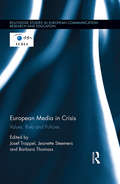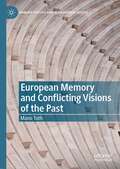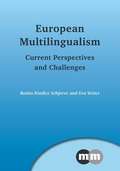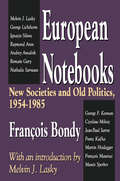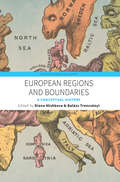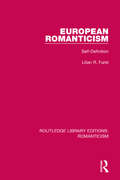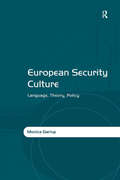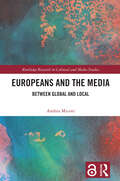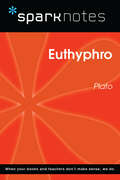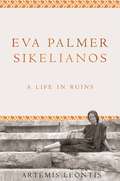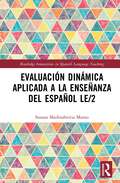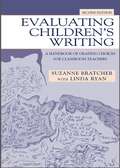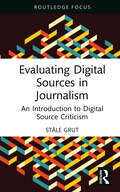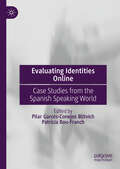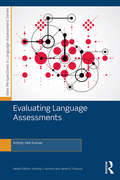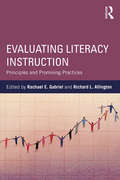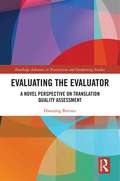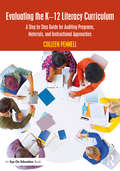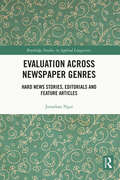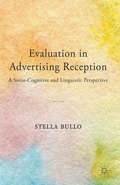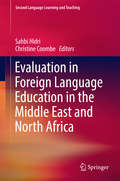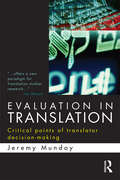- Table View
- List View
European Media in Crisis: Values, Risks and Policies (Routledge Studies in European Communication Research and Education)
by Josef Trappel Jeanette Steemers Barbara ThomassWhen the financial markets collapsed in 2008, the media industry was affected by a major slump in advertising revenues, and a formerly highly successful business model fell into a state of decay. This economic crisis has threatened core social values of contemporary democracies, such as freedom, diversity and equality. Taking a normative and policy perspective, this book discusses threats and opportunities for the media industry in Europe: What are the implications of the crisis for professional journalism, the media industry, and the process of political communication? Can non- state and non-market actors profit from the crisis? And what are media policy answers at the national and European level?
European Memory and Conflicting Visions of the Past (Memory Politics and Transitional Justice)
by Mano TothThis book discusses a number of ways in which the dialogue about Europe’s past and future could be rendered more inclusive, such as the promotion of critical and sentimental education and the creation of virtual and actual social spaces in which citizens and organised identity groups can participate. The discussion about European memory is far from being a “merely” symbolic issue with no political consequences. Imagining Europe and its past in different ways will lead to different real political outcomes. For instance, thinking about European integration as an embodiment of the values of the Enlightenment (such as human rights, liberal democracy, and reason), as a guarantor of peace on the continent, as a guarantor of prosperity, or as a guarantor that massive human rights violations like genocide will “never again” be committed on its soil, all entail different political objectives. Similarly, conflicting understandings of European memory as either a thing or a social construct, as either one memory or a plurality of memories, as either the end point of deliberation or a dialogical process, represent not merely inconsequential cultural “froth on the tides of society,” but crucially important issues with real political consequences. The book is intended to contribute to this discussion about the common European approach to the past (and thus to the future).
European Multilingualism
by Rosita Rindler Schjerve Eva VetterThis book provides a broad sociolinguistic perspective on major questions of political and cultural Europeanization. It is concerned with European multilingualism as it actually results from the intersecting endeavour of policy making and scientific research. This volume argues that the EU must overcome the major discrepancies of its linguistic diversity politics by developing into a multiple inclusive society beyond the nation-state in order to seriously unfold European multilingualism as a political goal. Expanding on the theoretical and methodological approaches developed within the EU project LINEE (Languages in a Network of European Excellence), this book further focuses on the LINEE key variables of European multilingualism i.e. 'culture', 'discourse', 'identity', 'ideology', 'knowledge', 'LPP', 'multi-competence', and 'power & conflict'. Against this background, this study argues for reconceptualising European multilingualism on the basis of an integrative and multi-focal approach.
European Notebooks: New Societies and Old Politics, 1954-1985
by Melvin J. Lasky François BondyA generation of outstanding European thinkers emerged out of the rubble of World War II. It was a group unparalleled in their probing of an age that had produced totalitarianism as a political norm, and the Holocaust as its supreme nightmarish achievement. Figures ranging from George Lichtheim, Ignazio Silone, Raymond Aron, Andrei Amalrik, among many others, found a home in Encounter. None stood taller or saw further than François Bondy of Zurich.In a moving tribute to his friend, Melvin J. Lasky, long- time editor of Encounter, writes, "Bondy was a breathtaking spectacle. I had known him to read and walk, to think and talk, all at once--and still make mental notes for his next article.... Early or late, seated or standing, awake or asleep, his incomparable spiritedness would always be darting from point to point, paying attention and idly wandering at once. Taken all in all, he still continues to represent for me perhaps a Henry Jamesian New Man."Bondy's essays themselves represent a broad sweep of major figures and events in the second half of the twentieth century. His spatial outreach went from Budapest to Tokyo and Paris. His political essays extended from George Kennan to Benito Mussolini. And his prime mÚtier, the cultural figures of Europe, covered Sartre, Kafka, Heidegger and Milosz. The analysis was uniformly fair minded but unstinting in its insights. Taken together, the variegated themes he raised in his work as a Zurich journalist, a Paris editor, and a European homme de letres sketch guidelines for an entrancing portrait of the intellectual as cosmopolitan.European Notebooks contains most of the articles that Bondy (1915-2003) wrote for Encounter under the stewardship of Stephen Spender, Irving Kristol, and then for the thirty years that Melvin Lasky served as editor. Bondy was that rare unattached intellectual, "free of every totalitarian temptation" and, as Lasky notes, unfailing in his devotion to the liberties and civilities of a humane social order. European Notebooks offers a window into a civilization that came to maturity during the period in which these essays were written.
European Posthumanism
by Manuela Rossini Stefan Herbrechter Ivan CallusIn literary studies and beyond, ‘theory’ and its aftermaths have arguably been over-influenced by US- and UK-based institutions, publishers, journals, and academics. Yet the influence of theory in its Anglo-American forms has remained reliant on Continental European ideas. Similar patterns can be discerned within the latest theoretical paradigm – posthumanism. European ideas influence posthumanism’s challenge to established understandings of humanism, anthropomorphism, and anthropocentrism, which is characterised by the increased urgency and proliferation of questions such as ‘What does it mean to be human?’ and ‘What is the relationship between humans and their nonhuman others (machines, animals, plants, the inorganic, gods, systems, and various figures of liminality, from ghosts to angels, from cyborgs to zombies)?’ European Posthumanism examines the histories and geographies of posthumanism and looks at the genealogies which have been at work in the rise of posthumanist thought and culture. This book was originally published as a special issue of the European Journal of English Studies.
European Regions and Boundaries: A Conceptual History (European Conceptual History #3)
by Diana Mishkova Balázs TrencsényiIt is difficult to speak about Europe today without reference to its constitutive regions—supra-national geographical designations such as “Scandinavia,” “Eastern Europe,” and “the Balkans.” Such formulations are so ubiquitous that they are frequently treated as empirical realities rather than a series of shifting, overlapping, and historically constructed concepts. This volume is the first to provide a synthetic account of these concepts and the historical and intellectual contexts in which they emerged. Bringing together prominent international scholars from across multiple disciplines, it systematically and comprehensively explores how such “meso-regions” have been conceptualized throughout modern European history.
European Romanticism: Self-Definition (Routledge Library Editions: Romanticism #10)
by Lilian R. FurstFirst published in 1980. This collection of carefully selected extracts from primary texts seeks to show what the Romantics themselves held Romanticism to be. The movement is thus defined in terms of the writers’ own views of their art both in general principle and in practical terms. This title will be of interest to students of literature.
European Security Culture: Language, Theory, Policy
by Monica GariupGrounded on tenets of cultural realism and social constructivism, Monica Gariup develops a theoretical framework to enhance our understanding of security culture at the European Union level. She employs tools from political theory, linguistic analysis and international relations theory to examine the implications of discourse and practice in European Security and Defense Policy (ESDP). Innovative in scope, the volume analyzes whether elaborating a structurationist solution and proposing a discursive syntax of security makes it possible to identify and compare different types of security actors. Providing a comprehensive and objective analysis on the links and implications between the discourse and actual policy of the ESDP, this is essential reading for scholars and researchers in European politics, international relations, security and cultural studies.
Europeans and the Media: Between Global and Local (Routledge Research in Cultural and Media Studies)
by Andrea MiconiThis book investigates the relationship between the process of Europeanization – the expected rise of a common culture – and the role played by the media in the different regions.Drawing on a comparative model, the analysis is structured around frameworks related to the action of the media in shaping national identities; to the world-system theory, based on the hierarchization of geographical spaces; and to the regional patterns identified in scientific literature. The analysis draws on data collected from numerous markets and across a variety of media formats, to detect the geographical pattern that results from the diffusion of different technologies and cultural contents: the national, the regional, the European, and the global.This nuanced and insightful volume will interest students and scholars in the field of communication studies, European studies, and comparative media studies.The Open Access version of this book, available at www.taylorfrancis.com, has been made available under a Creative Commons Attribution-Non-Commercial (CC-BY-NC) 4.0 license.
Euskaratú: Sabes más euskera de lo que crees
by Nerea ArostegiSabes más euskera de lo que crees, y este libro te lo demostrará. «¿Es complicado el euskera? ¿Cuando lo escuchas te parece que no entiendes nada?¿Piensas que es un idioma imposiblede pronunciar? ¿Tiene letras desconocidas? ¿Es una lengua que solo hablan unos pocos? Estas preguntas tienen algo en común: al final de este libro, tu respuesta a todas ellas será no». Euskaratú no pretende ser una lección de historia ni de filología vascas, sino un inteligente y entretenido ensayosobre el euskera. Repleto de curiosidades y rebosante de ejemplos, este libro desbroza no solo la belleza de una lengua a priori incomprensible para muchos, sino también, y esto es lo que más sorprenderá al lector, su cercanía. Porque, como demuestra Nerea Arostegi a lo largo de estas páginas, el euskera está mucho más presente en nuestras vidas de lo que pensamos.Se cuela en nuestras casas a través de los libros y la radio, la televisión, la publicidad o la prensa escrita. Cocinamos «cocochas» o bacalao «al pilpil» y usamos las «mochilas» para transportar objetos cómodamente; lanzamos «órdagos» y empleamos la palabra «izquierda» gracias al euskera. Comprender el uso y origen de este idioma nos permitirá desmontar ideas falsas y asentadosprejuicios en torno a él, y lo que es mejor: despertará en cualquier persona un interés insospechado por esta maravillosa lengua.
Euthyphro (SparkNotes Philosophy Guide)
by SparkNotesEuthyphro (SparkNotes Philosophy Guide) Making the reading experience fun! SparkNotes Philosophy Guides are one-stop guides to the great works of philosophy–masterpieces that stand at the foundations of Western thought. Inside each Philosophy Guide you&’ll find insightful overviews of great philosophical works of the Western world.
Eva Palmer Sikelianos: A Life in Ruins
by Artemis LeontisThe first biography of a visionary twentieth-century American performer who devoted her life to the revival of ancient Greek cultureThis is the first biography to tell the fascinating story of Eva Palmer Sikelianos (1874–1952), an American actor, director, composer, and weaver best known for reviving the Delphic Festivals. Yet, as Artemis Leontis reveals, Palmer’s most spectacular performance was her daily revival of ancient Greek life. For almost half a century, dressed in handmade Greek tunics and sandals, she sought to make modern life freer and more beautiful through a creative engagement with the ancients. Along the way, she crossed paths with other seminal modern artists such as Natalie Clifford Barney, Renée Vivien, Isadora Duncan, Susan Glaspell, George Cram Cook, Richard Strauss, Dimitri Mitropoulos, Nikos Kazantzakis, George Seferis, Henry Miller, Paul Robeson, and Ted Shawn.Brilliant and gorgeous, with floor-length auburn hair, Palmer was a wealthy New York debutante who studied Greek at Bryn Mawr College before turning her back on conventional society to live a lesbian life in Paris. She later followed Raymond Duncan (brother of Isadora) and his wife to Greece and married the Greek poet Angelos Sikelianos in 1907. With single-minded purpose, Palmer re-created ancient art forms, staging Greek tragedy with her own choreography, costumes, and even music. Having exhausted her inheritance, she returned to the United States in 1933, was blacklisted for criticizing American imperialism during the Cold War, and was barred from returning to Greece until just before her death.Drawing on hundreds of newly discovered letters and featuring many previously unpublished photographs, this biography vividly re-creates the unforgettable story of a remarkable nonconformist whom one contemporary described as “the only ancient Greek I ever knew.”
Evaluación dinámica aplicada a la enseñanza del español LE/2 (Routledge Innovations in Spanish Language Teaching)
by Susana Madinabeitia MansoEvaluacion dinamica aplicada a la ensenanza del espanol LE/2 explora el concepto de evaluación dinámica o diálogo colaborativo entre docente y aprendiente que va dirigido a favorecer el desarrollo lingüístico del aprendiente proporcionándole apoyo durante el proceso de evaluación.Este volumen explica cómo usar la evaluación como herramienta de orientación para favorecer un aprendizaje autorregulado y contiene recomendaciones prácticas para el diseño de pruebas y procedimientos de calificación dinámicos. Ofrece una revisión de las últimas perspectivas en el campo de la evaluación dinámica para español como lengua adicional y presenta implementaciones innovadoras y recursos actualizados para contextos de evaluación y examinación, incluidas rúbricas, escalas de evaluación y calificación, y modelos de examen. Enmarcada en la teoría sociocultural, esta monografía logra un equilibrio entre las discusiones teóricas, metodológicas y empíricas y es la primera obra dedicada a la introducción del dinamismo en la evaluación del español como lengua adicional de distintos modos comunicativos.Este volumen se dirige a estudiantes de posgrado, docentes, investigadores y administradores o directores de programas de lenguas interesados en la evaluación del español como lengua adicional, tanto desde un punto práctico como teórico.____________________________________________________________________________________________Evaluación dinámica aplicada a la enseñanza del español LE/2 explores the concept of Dynamic Assessment in Spanish LE/2 which is designed to promote linguistic development in language learners using collaborative dialogue between instructors and students.This volume discusses how to use assessment as a guidance tool to promote self-regulated learning and offers practical recommendations for the design of tests and dynamic grading procedures. It provides a review of the latest perspectives in the field of dynamic assessment for Spanish LE/2 and presents innovative implementations and up-to-date resources for assessment and examination, including practical assessment tools such as rubrics, scales of assessment and grading, and examination models. Framed in sociocultural theory, this book achieves a balance between theoretical, methodological and empirical discussions and is the first volume dedicated to the introduction of dynamism in the evaluation of different communicative modes in Spanish.This is the ideal volume for language program directors, language instructors, and postgraduate students interested in assessment models in Spanish language teaching, both from a practical and theoretical point of view.
Evaluating Children's Writing: A Handbook of Grading Choices for Classroom Teachers
by Suzanne Bratcher Linda RyanEvaluating Children's Writing: A Handbook of Grading Choices for Classroom Teachers, Second Edition introduces and explains a wide range of specific evaluation strategies used by classroom teachers to arrive at grades and gives explicit instructions for implementing them. Samples of student writing accompany the instructions to illustrate the techniques, and an appendix of additional student writing is provided to allow readers to practice particular evaluation strategies.More than just a catalog of grading options, however, this is a handbook with a point of view. Its purpose is to help teachers become intentional about their grading practices. Along with recipes for grading techniques, it offers a philosophy of evaluating student writing that encourages teachers to put grading into a communication context and to make choices among the many options available by determining the instructional purpose of the assignment and considering the advantages and disadvantages of particular grading strategies. Specific grading techniques are integrated with suggestions about the craft of evaluation--guidelines for instructional objectives, for student audience analysis, and for teacher self-analysis that help define communication contexts.New in the Second Edition:*a new chapter on state standards and assessments;*a reorganization of the chapter on approaches to grading;*additions to the chapter on management systems;*additions to the chapter on teaching yourself to grade;*additions to the annotated bibliography; and*updated references throughout the text.
Evaluating Digital Sources in Journalism: An Introduction to Digital Source Criticism (Routledge Focus on Journalism Studies)
by Ståle GrutBuilding on a rich journalistic tradition of critical source analysis, this book considers the impact of the move from analogue to digital sources on information quality and presents methods and tools to verify information found online and help counter the spread of misinformation. Evaluating Digital Sources in Journalism critically maps the prevalence of online manipulation, particularly images and videos from social media platforms, and considers the tools needed both to carry out and to counter this. Strategies are proposed to help readers evaluate content, context and sources, and ultimately build a foundation for carrying out their own online open-source investigations. The author brings together theories and best practices from a broad range of literature, including modern Scandinavian research on the concept of “source criticism”, journalism and technology studies, advanced forensic verification research, and literature designed for practitioners, including blogs and industry publications. Evaluating Digital Sources in Journalism is recommended reading for advanced journalism students and journalism practitioners.
Evaluating Empire and Confronting Colonialism in Eighteenth-Century Britain
by Jack P. GreeneThis volume comprehensively examines how metropolitan Britons spoke and wrote about the British Empire during the short eighteenth century, from about 1730 to 1790. The work argues that following several decades of largely uncritical celebration of the empire as a vibrant commercial entity that had made Britain prosperous and powerful, a growing familiarity with the character of overseas territories and their inhabitants during and after the Seven Years' War produced a substantial critique of empire. This critique evolved out of a widespread revulsion against the behaviours exhibited by Britons overseas and built on a language of 'otherness' that metropolitans had used since the beginning of overseas expansion to describe its participants, the societies and polities that Britons abroad constructed in their new habitats. It used the languages of humanity and justice as standards to evaluate and condemn the behaviours of both overseas Britons and subaltern people in the British Empire, whether in India, the Americas, Africa or Ireland.
Evaluating Identities Online: Case Studies from the Spanish Speaking World
by Pilar Garcés-Conejos Blitvich Patricia Bou-FranchThis book examines how identities are constructed in digital, multimodal discourse, and how these identities (gender, age, race, ethnicity, professional, etc.) are generally evaluated as they are claimed, attributed, verified, and non-verified intersubjectively in a polymedia space. Although the construction of online identity has been addressed in the literature, the online construction of identity in the Spanish speaking world has received less focused attention. This volume contains chapters by renowned specialists in pragmatics and digital communication, and is the most recent output of an ongoing externally funded project (UPO-1380703). The book includes a state-of-the-art introduction by the editors followed by three main sections: the first is devoted to examining digital identifies in conflict; the second addresses self-presentation on Twitter and Instagram, with a special focus on politics and gender; and finally, the third addresses identity construction in the genre of online reviews. All of the chapters address self and other identity construction in contexts of both convergence and controversy, in a variety of digital social platforms and practices related to gender, age, political stance, race, ethnicity, and lifestyle. Further, many of these chapters approach identity construction from a contrastive perspective, and thus address variation. This book will be of interest to scholars, researchers, graduate, and advanced undergraduate students in sociolinguistics, (contrastive) pragmatics, discourse analysis, media studies, linguistic anthropology, and communication studies, among others.
Evaluating Language Assessments (New Perspectives on Language Assessment Series)
by Antony John KunnanEvaluating Language Assessments offers a comprehensive overview of the theoretical bases and research methodologies for the evaluation of language assessments and demonstrates the importance of a fuller understanding of this widely used evaluative tool. The volume explores language assessment evaluation in its wider political, economic, social, legal, and ethical contexts while also illustrating quantitative and qualitative methods through discussions of key research studies. Suitable for students in applied linguistics, second language acquisition and language assessment and education, this book makes the case for a clear and rigorous understanding of the theoretical and methodological underpinnings of language assessment evaluation in order to achieve fair assessments and just institutions.
Evaluating Literacy Instruction: Principles and Promising Practices
by Richard L. Allington Rachael E. GabrielThis must-read book for all literacy educators illuminates the intersection of research on literacy instruction and teacher evaluation. Since 2009, 46 states have changed or revised policies related to evaluating teachers and school leaders. In order for these new policies to be used to support and develop effective literacy instruction, resources are needed that connect the best of what is known about teaching literacy with current evaluation policies and support practices. A major contribution to meeting this need, the volume brings together a range of perspectives on tools, systems, and policies for the evaluation of teaching, organized into two sections: • Crafting Systems and Policies for Evaluating Literacy Instruction • Examples of Alternative Systems/Approaches for Evaluating Literacy Instruction Across the text, expert scholars in the field emphasize the need for literacy professionals to do more than merely apply generic observation instruments for teacher evaluation, but also to consider how these tools reflect professional values, how elements of effective literacy instruction can be unearthed or included within them, and how teacher evaluation systems and policies can be used to increase students’ opportunities to develop literacy.
Evaluating the Evaluator: A Novel Perspective on Translation Quality Assessment (Routledge Advances in Translation and Interpreting Studies)
by Hansjörg BittnerThis book offers a theoretical framework for assessing translation quality grounded in supportive argumentation. The volume outlines a systematic framework for translators and translation critics to substantiate their decisions and judgments on a translation’s quality and in the case of negative criticism, put forward a more effective translation solution. The book traces the decision-making process underpinning translation practice, considering the different factors surrounding a particular translation to inform the most appropriate translation strategy, such as the temporal and geographical relationship between source and target texts, special provisions required by clients, timeframe, qualifications, and sociocultural and political issues. The framework posits that such factors should underpin any arguments used by the translator in adopting a given strategy and in turn, that any criticism of a translation’s quality must be in line with the same argumentative structure. Applied to a corpus of translation examiners’ reports of translation, the book demonstrates how this framework can act as a tool to be scaled to fit the needs of the different actors of a translation – translators, critics, and scholars. This book will be of interest to scholars in translation studies and practicing translators.
Evaluating the K–12 Literacy Curriculum: A Step by Step Guide for Auditing Programs, Materials, and Instructional Approaches
by Colleen PennellAs your school district undertakes the process of evaluating its K–12 reading program, literacy curriculum, or literacy instructional practices, this book will be your go-to resource. Pennell offers a step-by-step guide for educators, school leaders, or professional learning communities to evaluate high-quality instructional materials and standards-aligned literacy practices. It includes a wealth of tools such as timelines, full meeting agendas, stakeholder surveys, and evaluation rubrics. Chapters cover key topics, including: Literacy leadership team meetings Reviewing foundational skills Comprehension and vocabulary Evaluating writing Selecting new materials Implementing new literacy materials Supporting educators through instructional coaching and professional learning Pennell provides a straightforward framework for how educators can work together collaboratively to analyze, reflect, and ultimately evaluate their school district’s literacy program. Each chapter is grounded in salient research on the why of literacy teaching and learning and helps you understand how instruction can be meaningfully aligned with current standards. The research and theory that support effective literacy instruction—including culturally responsive practices—are explained in an accessible and pragmatic manner. The practical tools in this book are essential for administrators and educators tasked with evaluating literacy programs and practices, as well as graduate students who must learn how to audit a literacy curriculum. Whether you’re a school administrator, teacher, or reading specialist, this book will ensure all your students can reach success in literacy.
Evaluation Across Newspaper Genres: Hard News Stories, Editorials and Feature Articles (Routledge Studies in Applied Linguistics)
by Jonathan NgaiEvaluation Across Newspaper Genres: Hard News Stories, Editorials and Feature Articles is the first book-length study of evaluation or stance in three major newspaper genres: hard news stories, editorials and feature articles, the last of which is a Cinderella genre in linguistic studies. It offers a fresh approach to exploring the ways in which evaluation or stance contributes to the construction of the three newspaper genres, each with a distinct communicative purpose. Key features include using a 900,000-word comparable corpus of newspaper texts arranged by genre and topic domain, drawing on a specially developed framework of analysis with a strong orientation to news values, carrying out structural analysis by creating sub-corpora of different parts of newspaper texts and adopting a functional approach to evaluation in newspaper discourse. Evaluation Across Newspaper Genres amply demonstrates that evaluation plays a vital and yet dynamic role in the construction of hard news stories, editorials and feature articles by performing a great variety of discourse functions. In doing so, the book also illuminates such important linguistic concepts as specificity/variation and textual colligation. Providing a new and unifying perspective on evaluation as a prime driver of text construction, it will be of interest and use to researchers, teachers and students of English language, applied linguistics and journalism.
Evaluation in Advertising Reception
by Stella BulloPlaced within the context of reception studies, this book investigates how advertisements that rely on re-contextualising shared cultural knowledge are understood by their viewers, and examines their persuasive potential.
Evaluation in Foreign Language Education in the Middle East and North Africa
by Christine Coombe Sahbi HidriThis book presents evaluation cases from the Middle East and North Africa (MENA) context, investigating the various facets of evaluation in different parts of the MENA region and beyond. In 19 chapters, it explores cases from Tunisia, Saudi Arabia, Egypt, Sudan, Syria, the UAE, Turkey, Iran and Morocco. The book highlights the impact of evaluation on a range of stakeholders, arguing that it has repercussions at the individual, societal, economic, cultural and political levels, that it also has an ethical dimension, and that it is tailored to people's needs, helping them to remain abreast of the effectiveness and efficiency of programs. Further, the book explores controversial issues concerning different evaluation themes, such as teacher and staff evaluation, assessment practices, text genre analysis evaluation, assessment of productive skills, textbook and ICT evaluation, evaluation of ELT certificates and programs, quality assurance, ESP needs analysis, assessment literacy, and dynamic assessment. It addresses key challenges, such as who the "right people" to implement evaluation are, and the appropriate use of evaluation results to avoid any misuse or harm to any stakeholder. In closing, the book calls for further research venues on the relevance of evaluation, testing and assessment in the MENA context and beyond.
Evaluation in Translation: Critical points of translator decision-making
by Jeremy MundayIn this book, Jeremy Munday presents advances towards a general theory of evaluation in translator decision-making that will be of high importance to translator and interpreter training and to descriptive translation analysis. By ‘evaluation’ the author refers to how a translator’s subjective stance manifests itself linguistically in a text. In a world where translation and interpreting function as a prism through which opposing personal and political views enter a target culture, it is crucial to investigate how such views are processed and sometimes subjectively altered by the translator. To this end, the book focuses on the translation process (rather than the product) and strives to identify more precisely those points where the translator is most likely to express judgment or evaluation. The translations studied cover a range of languages (Arabic, Chinese, Dutch, French, German, Indonesian, Italian, Japanese, Russian, Spanish and American Sign Language) accompanied by English glosses to facilitate comprehension by readers. This is key reading for researchers and postgraduates studying translation theory within Translation and Interpreting Studies.
